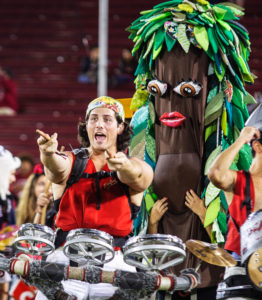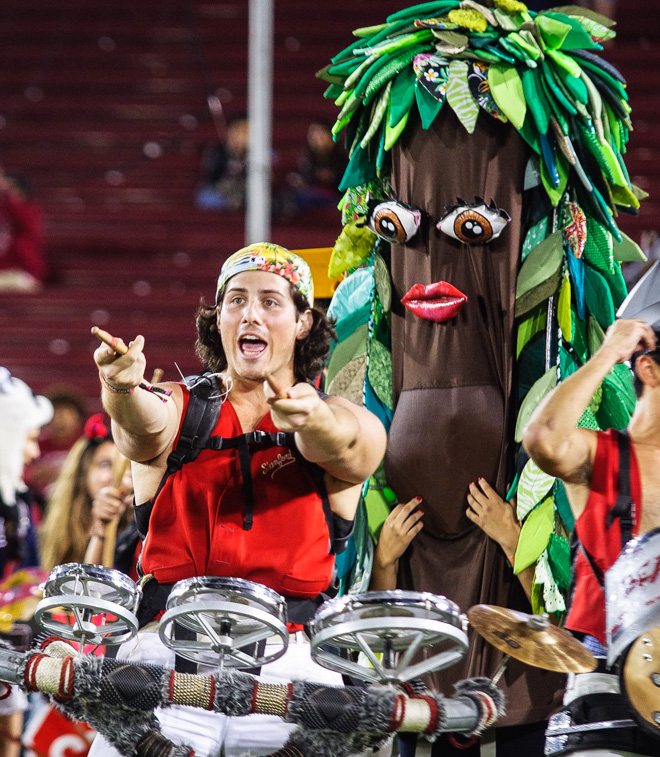Alumni of the Leland Stanford Junior University Marching Band (LSJUMB) have spoken out against the decision to bar the Band from travelling to Big Game this weekend. The decision, made known to the group this week, was a result of a travel ban instituted on the Band last year based on Title IX and Office of Community Standards violations.
Alumni remain active in the Band post-graduation, such as former trombonist Allison Hayward ’85, who marched in the 2013 Rose Bowl but was not permitted to in 2015. Hayward said that the ban is negatively impacting allegiance to the LSJUMB.

“The Band is less attractive to students with no travel and has gotten quite small,” Hayward said. “Because it isn’t big, it isn’t as effective musically or visually.”
Title IX investigations in May 2015 first banned the Band from travelling due to allegations of sexually explicit and offensive acts, hazing and violations of alcohol and controlled substance policies. The relevant complaints were first filed in 2011.
The LSJUMB now faces four new complaints of breaking the alcohol suspension and travel ban, but Lapin said these counts are not deciding factors in the ban on Big Game.
“While the decision to deny travel to the Big Game is based on the previous unmet expectations, not on new complaints, these pending charges do not dispose the University to grant further exceptions to the travel ban,” Lapin said.
Despite these complaints, Band alumni still look fondly back on their time as members. For trumpeter Maria Anderson ’85, the LSJUMB was a way to support Stanford athletics when she medically retired from swimming.
“What people need to remember about the Band is that, as a group, they are the biggest supporters of Stanford athletes, going to sporting events well beyond football and basketball — volleyball, baseball, soccer, tennis, water polo, track, you name it — equally supporting the men and women,” Anderson said.
Anderson also noted that since many athletes cannot “go pro,” collegiate sports are the highest point in their athletic careers. She said having the support of the Band helped enhance the experience for these athletes.
“The travel ban imposed on the Band is robbing those athletes of an important part of their experience,” Anderson said. “Who is going to play ‘Hail Stanford Hail’ when we beat Cal? Who is going to play ‘All Right Now’ when we score?”
Even for non-athletes, the Band represented a sense of unity, according to Ted Delianides ’84. Delianides regularly holds tailgates in his home state of Colorado and said that his attendees were unhappy that the Band did not appear at the game.
“To say that the alumni were distressed that LSJUMB didn’t make the trip is an understatement,” Delianides said. “The travel bans, though hopefully an effective punishment for misbehaving band members, [are] unfortunately a punishment for the out of town alumni.”
According to Lisa Lapin, vice president of University communications, the Title IX office and Office of Community Standards found that the LSJUMB made insufficient progress in remedial actions.
Lapin said that the University allowed LSJUMB to travel to the 2015 Pac-12 Football Championship and the 2016 Rose Bowl following initial improvement, but that the band has made no progress in completing an outlined list of changes from the Office of Student Affairs (OSA) since.
But, by way of changes in LSJUMB culture, Ann Scheder ’85 said she saw improvement.
“As a Mellophone player, parent and person who still plays in the band a few times a year, I have been impressed with the way the Band has worked on making their culture inclusive and welcoming,” Scheder said.
Some Band alumni claim that OSA has not in fact given the Band an outline, however, and that they are waiting to do so until after the Title IX hearing in December.
In the meantime, Lapin said the OSA is working closely with LSJUMB leadership to accomplish remedial goals. Progress will be reviewed before football bowl season and again before basketball postseason, if necessary.
Some alumni claim that the OSA is imposing the ban in an attempt to eradicate the LSJUMB and to establish a more traditional marching band. Hayward said that the University should be clear in its intentions and treat the Band the same way it treats all student organizations.
“Whatever else, it needs to treat student groups fairly and evenhandedly,” Hayward said. “I wonder how many teams, fraternities or clubs could fulfill the demands currently imposed on the Band.”
Current Band members declined to comment for this article.
Contact Gillian Brassil at gbrassil ‘at’ stanford.edu.
